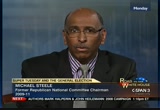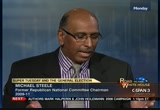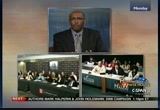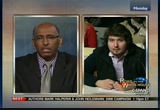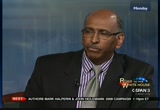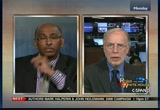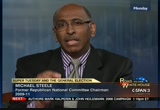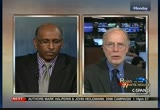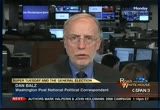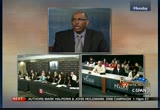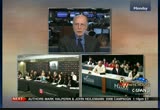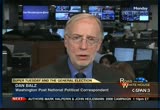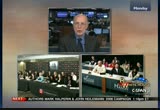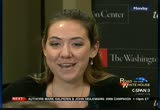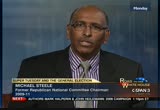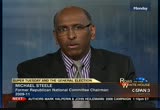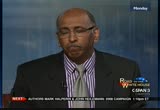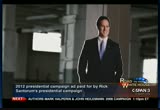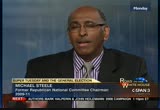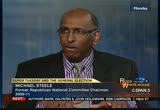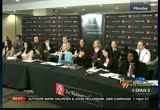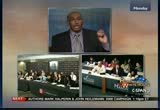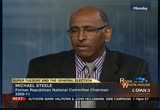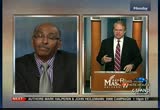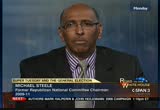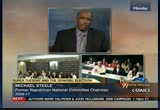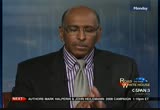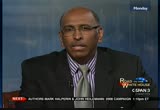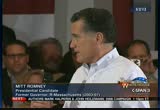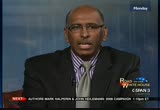tv [untitled] March 6, 2012 12:30pm-1:00pm EST
12:30 pm
skin of this campaign. and i do not see anyone going quietly into that good night with respect to bowing out and letting romney have a free shot to the nomination. i just don't see that happening. >> dan balz, i'm going to give you a chance in a minute to ask john steele the big question, whatever that may be. >> i'd like to follow up now on what michael steele said, given wounded party that comes together eventually, what they're going to do to beat the democrats? i know jim has a good question along those lines. >> i think a lot of it is going to depend on the arguments that are made. we -- as a party, a national party, we are way off message right now. we are talking about stuff we have no business talking about because it is -- it reminds me so much of the terry schiavo conversation during the bush administration years.
12:31 pm
and beyond the pale and outside the purview of a national party to inject itself into personal decisions. we cannot on the one hand rail against democrats for, you know, wanting to take control through government auspices of our lives and our businesses and the like, but then in the same, you know in the next breath, you know have the kind of conversation we have and see the kind of legislation proposed that people interpret as doing that very same thing. so we've got to get off of that. and i think focus in on the strength of the argument which is at the end, jobs, economy, growth, small business, entrepreneurism. the backbone of this country's economic engine. and have the conversation where we do the one for one, the comparison of policies that are government centered versus policies that are free market centered. to challenge the notion that making money, being wealthy,
12:32 pm
aspiring to wealth creation is somehow negative. i don't know if any of the students this morning got up and looked in the mirror and said all i want to be today is poor. that's not why you are in school or trying to find the keys to advance your own personal improvement. you aspire to a certain level of wealth for yourself. some of it monetary. some of it personal. and that's, i think, a very positive argument for the republican party to get back on making. the policies of this administration where you are talking about the growth in debt, the spending, whatever it happens to be. you can make the argument, have been destructive overall. and we've gotten off of that mae message and now talking and playing the ball really the way the democrats want us to play it where the president is not talking about his record. even to the extent he's talking about his record. he's not talking about health care. and those again, the types of things we can push back on that we just haven't. >> let's get a quick follow-up from one of the george mason
12:33 pm
students. >> jim you had a basic strategy question. >> i guess specifically, do you shore up the conservative base as the republicans did successfully in 2004 and 2010, or do you move to the center to sort of challenge obama on main 2006 happen again. 2006, the base was so fed up with big government republicanism that they stayed home. they did not support our efforts on the ground. i was a senate candidate in 2006. and saw after the fact the drop-off. about 6% of our base stayed home versus what we saw in 2004 and 2002. so that's going to be very important. my first six months or so as national chairman was to reassert the party into the political discussion. they had written off the gop.
12:34 pm
the goal was to reassure the base that we were the conservative party of this country. we were going to stand encore principles and we were going to fight for those principles in order to protect the idea of an american entrepreneurism. so i think that's going to be a very important effort, first ever coming off of the primary. as you begin to meld that into a national discussion, a center right discussion about what i just said before where the country goes next. >> dan balz, weigh in on this point. clearly you want to make sure the base is comfortable with your candidacy but then you need to expand the base and appeal to the independents. >> that's exactly right. and what we've seen in this campaign, and actually what i wanted to ask michael steele, goes to this question. i mean, on the one hand, governor romney has had to work very, very hard to try to convince the base that he's acceptable to them. not that they are going to say he's their first choice but that he's acceptable to them and he's
12:35 pm
struggled to do that. but in doing that, we can see what's happened with him in independence which is that independents have become increasingly negative in their assessments of governor romney. my question for michael steele is, if this race goes on until some time in late april or early may, which it certainly could, and with the kind of competitiveness we've seen and the tone that we've seen in this race, how badly damaged do you think governor romney will be? are you worried that you could be losing the general election as you are picking a nominee in the spring of 2012? >> i think the way we lose the general election now is less about the process. as i said a little earlier, and more about how our candidates frame the arguments. we can have, i think, president obama has played mitt romney very well to this point. and a very good example of that is this whole discussion we've
12:36 pm
had with miss fluke and her wanting to testify. the rush limbaugh comments. would have been a wonderful sister soldier moment for mitt romney to stand apart from those who in the party leadership who are afraid to take on mitt romney. i know firsthand i've -- i mean rush limbaugh. i've had the dance with rush limbaugh as national chairman. and know what that sting feels like. but it's important for people to understand that he's not an elected official in the party. he doesn't get to call the shots, all right? that's the reality of it. and for mitt romney, that moment to look america in the eye and say, this is not what conservativism is about. this is not the party that i want to lead. this is not the country that i want to lead. would have defined him differently. and i think probably going forward would have given him such an expansive opportunity because, remember, if you take the conventional wisdom, you are going to be the nominee,
12:37 pm
regardless of what else happens. why not begin to take that effort to push the envelope, to make that pitch if you will, to those independent voters that polls have already shown that you've lost and are losing to show that you are not to an ideology that is not consistent with the values of this country. and i think that that's an argument that mitt romney has to make coming out of this thing, dan. in order to really begin to bring those pieces together that he's going to need to defeat obama in the fall. >> but do you think he missed that moment by not doing it in realtime? >> yes, i do. i really do. it doesn't mean he won't have that opportunity down the road or that there's some way in which he can make that moment up on the back end, but this is that time. in politics, this stuff only comes around like that. and when it does, you have to grab it. it's like lightning in a bottle. grab it and make the most of it. this was that moment where everybody else fell silent. for his voice to rise above all
12:38 pm
others nod say with clarity, this does not stand. it is not how we treat citizens. it is not the kind of leadership that i want to bring. it's not reflective of the values of the gop. it's not reflective of conservativism. and it's out of bounds. it's wrong-headed and it has no place in my world that american people which is why i am running for president. i think it's a moment missed. >> and dan balz, a couple of thoughts from you? >> you know, i mean, i agree that that was a moment, and politicians do need to seize those moments. i mean, the hold that rush limbaugh has over the conservative and republican establishment is pretty powerful. and we've seen it time and time again. and this is one in which advertisers have certainly voted with their dollars and the democrats have been very deft in going after it and exploiting it and taking advantage of it. and, you know, i think he's
12:39 pm
right. governor romney had a moment there where he could have said it. he could have said it in his own language but he didn't. you don't get a lot of those opportunities. it seems this was an opportunity lost. >> if you want to -- for the students if you want a comparative moment, sister soldier, bill clinton, where i remember the gnashing and wringing of hands where he clear went out against the grain in taking on a popular, i iconic at that time, african-american performer to really kind of set the tone for his campaign and it defined him. blacks didn't run away from him. didn't turn against him. in fact, they were kind of impressed that he would stand up and make a principled argument. and i think that's what this moment afforded mitt romney. >> dan balz, i have one sidebar question before we return to politics and say good-bye to you. you've been covering politics since 1968. technology has changed.
12:40 pm
but your general approach to storytelling and reporting has been pretty consistent. what is that approach, and what keeps you motivated every day to cover politics in 2012? >> well, steve, i mean, covering politics is a great privilege. it sounds corny and a little cliche, but it really is. those of us who are on the trail and who are able to follow these races as closely as our news organizations allow us to, this gives us an extraordinary opportunity to see history in the making. and for anybody who is in journalism, that's part of the reason we're here. there are a lot of other aspects to journalism, but the storytelling is important. you're right. technology has changed enormously. i don't think it's changed any more dramatically than in the time since the 2008 election and this election. the simply the arrival of twitter has fundamentally changed the nature of the way the news business and political reporting is taking place. and so i think that for me, one of the things that i've always tried to do is think about different audiences.
12:41 pm
that we have an audience that reads the "washington post" both in this metropolitan area and online who are devoted political aficionados. political junkies of the first order. and they want the best and most detailed and constant information. we also have, in many ways, and some ways, a more important and larger audience and that is the general public who are looking to us to help them sort through all kinds of stuff that's coming at them. there's such a flow of information coming at people today. i think they look to us. and i think one of the things i've always tried to do, and it's what i've learned from others who taught me over the years, begin with dave broder, but including others, that you have to make this topic accessible to people. the more we're in the weeds, the more i think we do a disservice to people, to that general audience. peter hart who is the democratic pollster and who with the republican pollster does the nbc/"wall street journal" poll, said something to me years and
12:42 pm
years and years ago when i was a youngster starting out in politics and covering it. and he said, you are not a handicapper. a political reporter is not there to simply predict who is going to win or lose a race. but he said the most valuable thing that good political reporting can do is that on the morning after an election, when people wake up and say the country has elected so and so as the next president, that you have helped them understand why that happened. that you have described for them through the course of a year, not in any one story, but through the course of a year, the forces that are at work. the issues that are at play. the characters of the candidates. the personalities. the highs and lows. so that they don't wake up surprised and say, well how in the world did that happen? i had no idea that this might be the case. and i think that we've tried to do that at "the post." i've tried to do that in my own vd reporting. >> nobody does it better than dan balz. thanks for sharing a couple of
12:43 pm
minutes with us here on c-span. >> thank you, steve. >> good see you, dan. take care of yourself. >> thanks, mr. chairman. you take care. >> i will. >> back to more of your questions. anna hall from the washington center. anna? >> hi. we heard dan mention that the extended primary process may be hurting the potential candidate for the republican party. mr. steele mentioned that he thinks it's actually a good thing. hi. the new chairman believes a goo thing. is there -- do you think the republican party, regardless of how long this goes on, is building the infrastructure and is ready to take on the obama machine and make this about obama's failed policies and his inability to lead and unify the country? >> that's a very good question. and i can honestly say, i don't know. but i have my worries and my ab. the fact that they just hired
12:44 pm
last month or in the month of director, which i always found that outreach notion to be somewhat comical and farcical, but i don't know. they are saying they're going to have hispanic coordinators and directors in the, i guess, the key states which probably means 10 or 15 states or so. my approach was much more broad paced. it was more bottom up. in order to get ready for the 2010 elections, i had to first get on the ground and prepare with the elections of chris christie and bob mcdonnell in new jersey and virginia, respectively. the special elections. we all remember the new york 23 race and what excitement that brought to the political process. where the first time you had the base of the party push back against the establishment and reject completely their choice. so it was a lot of lessons taught to me leading up to the
12:45 pm
2010 election about putting a comprehensive effort on the ground. our goal was to build -- we created a coalitions department which has since been disbanded that allowed for that kind of reach out if you will, to folks, to new people. and to get the organization, to get the base fired up, to get them engaged, to get the money coming from the bottom up. not just the top down. from the major donors. i know the emphasis has been on top down major donors coming back. but how are you doing in keeping and growing the number of individual small donors. what's the infrastructure you put in to help the state parties. they are the front lines. that's your offensive and defensive line for the big game in november is because those state chairman are the ones who are going to have to take what limited resources they have to actually go out and build the infrastructure from the bottom up. so that you have the door
12:46 pm
knockers, the sign wavers, but also people on election day who are getting your voters to the poll. i don't know pause i have not seen that structure in place. it's important that it be there. obama has met and surpassed the gop's effort so far. in other words, throughout this primary process, they have also been building. so where we may have, you know, three or four satellite offices, they've got 10 or 12. so we've got to meet that at some point. i don't know if we are ready for that yet. >> let me share with you from the romney super pac one of his campaign spots and also from the santorum for president committee. >> rick santorum's been in washington so long, he's called the ultimate washington insider. santorum voted to raise the debt limit five times. and for billions in wasteful earmarks, including the bridge to nowhere and a tea pot museum. santorum says -- >> in fact, i'm very proud of all the earmarks i've put in bills.
12:47 pm
>> i've defended my earmarks in the sense that i'm proud of the money that i did set aside. >> rick santorum, washington insider. big spender. estore our future is this message. i'm rick santorum and i approve this mes misromney's ne machine is back on full throttle. this time here's firing his mud at rick santorum. romney and his super pac have spent a staggering $20 million supposedly attacking federal republicans. why? because romney is trying to hide from his big government romney care. and his support for job-killing cap and trade. and in the end, mitt romney's ugly attacks are going to backfire. >> so michael steele, you've seen this from a number of vantage points, as a candidate and political observer and political chair. how influential is television advertising? >> you know, i have always been amazed by that because people tell you all this stuff. i'm so sick of the negative ads
12:48 pm
and it just makes me ill and yet they buy it. they are so gullible for it. it's amazing. the impact that they are able to have in running those two examples of negative ads. i mean, saw what it did to newt gingrich. that was all tv ads that just stomped the political life out of his campaign. and yet people will tell you, every day folks whose tvs are bombarded with this stuff that i'm so sick of it. it doesn't have an influence, but it does. it's subliminal. it creates doubt. that's really what it's all about. i need to give you something else to think about about this individual. i'm not going to come heavy and hard. some of it is campy and over the top but at the end of the day i've planted a seed that when you plant that seed and continue to water it with a lot of other negative stuff, where weather th -- whether they read it in print or on twitter, reading stuff online, it reinforces it
12:49 pm
and nurtures it to the point where when you go to that voting booth, you vote against the guy that you really like and you see it in the polls. you know, going into any of these states, rick santorum or newt gingrich has been besting mitt romney seven, eight, ten poit points going in. ohio is a good example coming up where, you know, rick santorum had like a ten-point lead. it's now even money at best. why? because the negative advertising went in and started chipping away at santorum's heels and brought him down to the point where they could effectively deliver the knockout punch with what? their organization. their turnout on tomorrow. so, yeah, it's very effective. and no matter how much you protest as the victim of these types of things, if you had the money and this goes back to the earlier discussion. if you had the money, yeah, you would be doing the same thing, too. but, remember, our redesign of this process had nothing to do
12:50 pm
with your ability to raise money or spend money, keep money. again, we were creating a process, a playing field on which you can go play. how you got there and what you you can play. how you got there, once you do when you're there, it's still up to the individual candidates. >> going to politics 101 you want to define yourself on your own terms. >> you always want to define yourself on your own terms. you never want your opponent to define you. >> where the process begins in iowa, also new hampshire. go ahead. >> mr. steele, you talked a little bit earlier about obama care and the failed policies of president obama and no one in the republican party has really picked away at that. if mitt romney is the candidate, do you feel it's going to be a little harder for him to pick away at obama care simply because of romney care in massachusetts. >> yeah, i do. i'm sorry. that's the political reality of
12:51 pm
it. deal with it. i said from day one i always thought romney should own up to what he did in his own hand. he was a governor that put in place something he thought was the best for people of the state. that's what they said they wanted. he did what leaders do in response to their people. the pivot to that response is i got it right, he got it wrong. when you start from a defensive posture, i didn't create that. i don't know what it is. it makes it easier for your opponents to come back and whip saw you on the issue. they don't have to take it out of context, word or words, at the time you were doing what you were doing and use that against you. you want as a candidate to neutralize, if not take away completely, opponent's ability to take signature pieces of legislation you've authored or things you've done as an elected official and put your own mark on it early.
12:52 pm
i don't think that was done by the romney campaign, largely because those attacks came from within at first. he had not sufficiently in the time from his initial running in 20 2007, 2008 for this moment defined for the base or contextualized for the base what the whole health care plan he developed was about. now you're seeing individual mandate comments come back against him. that's being played out in "the washington post." it's about defining yourself as a candidate. not just defining who i am, but what i've done. the most effective pushing back is rick santorum, which is why not a lot of ugly hits stuck on him. where he is running into problems he's verbalizing contemporaneously on stuff that is seven or eight years old.
12:53 pm
he's volunteering in terms of social commentary. >> or 50 years old. >> i have no idea what that was about. you just don't do that. >> go back to george at mason university. >> it struck me looking at the romney versus santorum victory speeches and santorum's inability to kind of intuitively know when to make a rhetorical moment work, i feel like with romney out the proceeds but no poetry. there's a sense of something lacking. with santorum poetry gets out of hand as it does with santorum. it also occurred to me, this is something barack obama's base is missed abo miffed about. they thought they were getting poetry but had proceeds. there's a question how the republicans might take advantage of that. >> hi. my question is in your opinion has barack obama lost support of the black community and do you think republican nominees are
12:54 pm
actively engaged in courting the black voters who may or may not be in support of obama now? >> let me do the second question first. the answer is easy. no, they are not. there's no effort at all. it's underground or in the shadows. at least with the current leadership in that regard. i think african-american voters have been written off as unabashedly and very much a democrat vote. i still do not subscribe to that. i know my community well enough to know there are disparate and diverse voices in it. if we take time to cultivate a relationship we can make headway. during my term we elected two african-americans to congress, congressman scott and west.
12:55 pm
we've elected a number of hispanic governors and leaders, african-american legislators at the state level. so it came from a concentrated effort and focus on developing that. the first part of your question, i don't think as a matter of blacks not supporting president obama. they will support president obama. it doesn't mean they are not frustrated with him. to the lead-up point that i think there's been a lot of expectations on the president in terms of what his would be like, how it would be played out. his progressism, if you will. a community activist organizer. that means at least in some sectors a certain thirng thng t even the gop bought into. i don't think anyone thought the president would come in and do what he's done on foreign policy, which is so down and consistent with what republicans have argued and bush doctrine, if you will.
12:56 pm
the president's use of drones surpassed anything george bush did as president. so i think a lot of the liberal base in looking at someone like barack obama sort of mirror whether or not a lot of republican base think about in terms of mitt romney. both gentlemen find theirselves doing a dance. the president is not in it now because he's not a primary. who is challenging him? no one. his challenge will come in the fall when he's got an opponent and infrastructure behind that opponent bombarding him from various sectors, not just on the obvious stuff like health care but even on some of the foreign taken, certainly on economy and jobs creation, government control of and ownership of the auto industry. people forget the government still owns while everyone is applauding the profits, the government is the
12:57 pm
one who is controlling that. what happens when -- how do we get the government out of that? no one has talked about that. that's going to be part of the conversation this fall. regardless of what you may feel about it, that rankles at people that the government owns part of our private sector that way. that's part of the conversation the president is going to have to deal with in a real way, hasn't had to so far. it raises concerns right and left about both potential candidates or eventual candidates for presidency as to whether or not they are true enough to their base that i'm going to go out and support them. i think the romney base, that's going to be a bigger question than it will be for the obama base. >> let me circle back to some of your earlier points and conclude with thoughts about where rick santorum is and how mitt romney comes across. two examples in the cleveland, ohio area. let's begin with mitt romney in a town hall meeting. >> what a thrill it is to do
12:58 pm
what i'm doing. i mean, can you mj running for president of the united states. this is not something i expected to do. when avis boy, a young guy, i wanted to be a police officer. as i got older, i wanted to do what my dad did, be in a car company. i hoped to run a car company some way. then i got in business on my own, never thought i'd get involved in politics of all things, just couldn't imagine that i'd get involved in politics. here i am running across the country, meeting people. it's such an extraordinary opportunity to get to know america. see, if you watch the evening news, you see people who are doing things out of the ordinary. that's why it makes news. by anderson large those aren't good things they are doing. you come away with a bit of a cynical view about what's going on across the country. when under the circumstances to do what i do and you meet average ordinary citizens like ourselves, why then you get a sense of what really is at the
12:59 pm
heart and core of the american people. and it's good, it's encouraging. it gives me more optimism about the future of the country, just to meet our citizens across the country, not those doing the most unusual things. >> quit comment. >> i understand what mitt is doing there, how he's trying to weave the story line of what i wanted to do when i was a young boy, i never thought i would be there. i appreciate that very much. i think it's a side of him more people would like to see and hear a lot more about. then weave that story into the policies that you will specifically advocate for as president of the united states. very good moment for me. a very telling moment for me was early in the debate we had eight, nine people on the
106 Views
IN COLLECTIONS
CSPAN3 Television Archive
Television Archive  Television Archive News Search Service
Television Archive News Search Service 
Uploaded by TV Archive on

 Live Music Archive
Live Music Archive Librivox Free Audio
Librivox Free Audio Metropolitan Museum
Metropolitan Museum Cleveland Museum of Art
Cleveland Museum of Art Internet Arcade
Internet Arcade Console Living Room
Console Living Room Books to Borrow
Books to Borrow Open Library
Open Library TV News
TV News Understanding 9/11
Understanding 9/11